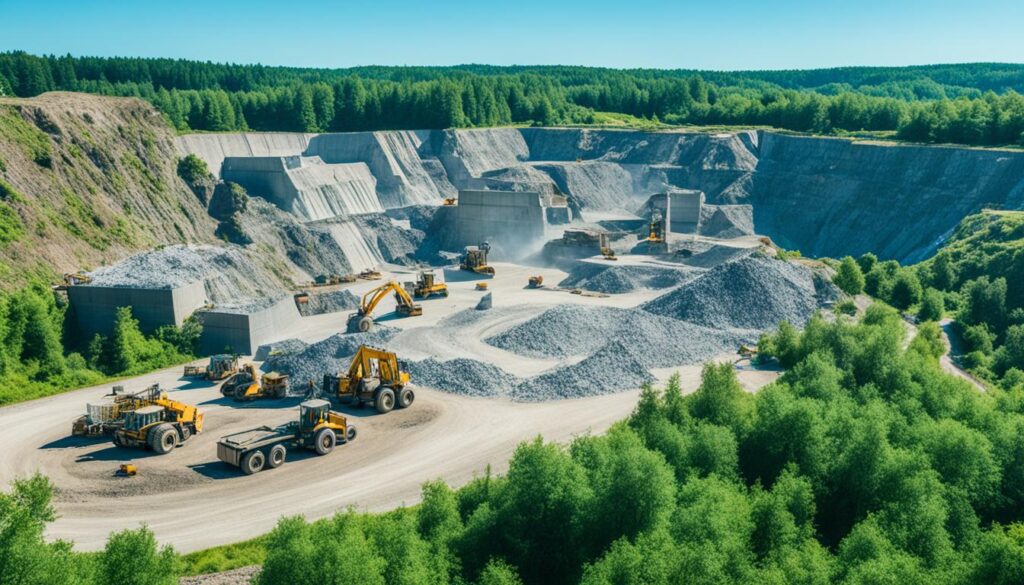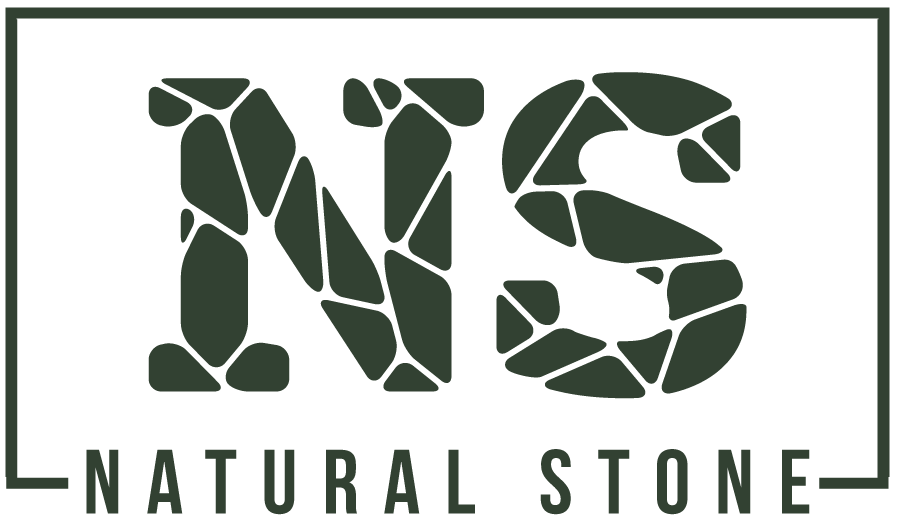Ensuring Sourcing Transparency: Key Stone Queries
The journey towards responsible stone sourcing is rooted in transparent practices. The Natural Stone Council’s ANSI/NSC 373 standards are vital. They offer bronze, silver, gold, and platinum certifications. This confirms ethical and sustainable practices in the industry1. By adopting ethical quarry practices, companies can manage risks, support labor rights, and care for the environment.
The Ethical Trading Initiative (ETI) works with the Rajasthan Sandstone Working Group (RSWG). Together, they’ve created guidelines for ethical stone sourcing. These guidelines help firms adopt responsible practices and boost their social responsibility. Ethical practices mean promoting better labor standards and work conditions.
Polycor is a leading example, having earned NSC-373 certifications for their quarries. Their certifications include CAMBRIAN BLACK®, CALEDONIA™, and BETHEL WHITE®1. This shows their commitment to labor standards, which helps protect their brand, gives them a competitive advantage, and could save money.
INDIANA LIMESTONE® and other premium stone materials have also received ANSI/NSC 373 certification. This underlines a commitment to ethical and responsible sourcing within the stone industry1.
Key Takeaways
- ANSI/NSC 373 standards establish ethical quarry practices in the natural stone industry.
- ETI guidelines provide practical steps for responsible stone sourcing.
- Polycor’s various quarries have achieved NSC-373 certification, exemplifying commitment to ethical practices1.
- Companies can enhance brand reputation and achieve financial efficiencies through ethical sourcing.
- Ethical sourcing promotes labor rights and environmental stewardship within the stone supply chain.
Importance of Ethical Stone Sourcing
Ethical stone sourcing is crucial. It ensures stone extraction respects human rights and the environment. It combines labor rights with buying practices. This guarantees all workers are treated well and work in good conditions. Such practices improve labor standards and affect the lives of quarry and facility workers positively.
Understand Ethical Sourcing
Ethical sourcing requires careful risk management and adds value. Companies focus on this to meet international labor standards and expand their market. For example, Solstice stands out for its responsible supply chains in the crystal industry. They spend thousands of hours on research to ensure their products are ethical2. It also means being open, trackable, and fair to all workers.
Why Ethical Sourcing Matters
Ethical stone sourcing tackles social responsibility. Large-scale mining can harm the environment, causing erosion and contaminating water2. Poor work conditions in places like Rajasthan need improving efforts3. Ethical sourcing also includes protecting the environment by filling up mines again and replanting native plants2. Much of the stone in markets like the UK comes from Asia, especially India. This shows the need for ethical oversight there.
Ethical sourcing’s impact goes beyond being responsible socially and environmentally. The UK government’s action plan from 2013 shows its growing importance in business3. It promotes fair work and helps community projects, like those in Bahia, Brazil2.
| Aspect | Benefit |
|---|---|
| Labor Rights | Guarantees fair treatment and good working conditions for all workers2 |
| Environmental Standards | Promotes sustainable practices such as backfilling and replanting2 |
| Market Share | Increases market share and enhances brand value3 |
| Community Projects | Supports community development and education programs2 |
Developing a Business Case for Ethical Stone Sourcing
Building a strong case for ethical stone sourcing is crucial. It highlights the importance of ethics and meets legal needs. Plus, it gives companies an edge over competitors.
Reputational and Legal Risk Management
Managing legal risk in stone sourcing is essential. By following the Modern Slavery Act 2015, businesses like Amarestone have joined The Ethical Stone Register. This ensures they meet ethical sourcing standards4. Being compliant avoids legal problems and boosts the company’s image.
It’s important to manage the risks to your reputation that come from unethical sourcing. Child labor in the colored stone industry shows the risks of ignoring responsible practices5. Having proof of ethical practices strengthens company policies. This helps keep a good reputation with all involved4.

Competitive Advantage
Choosing ethical sourcing can strongly differentiate a company in the stone industry. Companies on the Ethical Stone Register appeal to buyers wanting responsible products4. Ethical sourcing sets a company apart and creates lasting value.
Meeting the demand for ethical products can greatly benefit a company. Millennials, who will spend about US$1.4 trillion each year, favor ethically sourced goods5. The advantages of ethical sourcing are clear. More companies are adding ethical practices to their fundamental strategies.
| Benefit | Details |
|---|---|
| Reputational Risk Management | Enhances company image by adhering to ethical practices5 |
| Legal Compliance | Meets requirements of laws like the Modern Slavery Act4 |
| Consumer Trust | Builds loyalty among consumers who value responsibly sourced products |
| Competitive Differentiation | Achieves a market edge by including ethical sourcing in the business strategy |
| Long-term Value | Establishes sustainable practices that attract long-term stakeholders4 |
Transparency in Natural Stone Sourcing: Questions to Ask
Making stone sourcing transparent is key to being ethical, eco-friendly, and guaranteeing quality. To understand a supplier’s ethics and environmental efforts, you need to ask targeted questions. This helps figure out how serious they are about responsible quarry work.
How to Assess Supplier Transparency
To check if a supplier is open, start by analyzing risks and understanding the stone’s supply chain. This lets us see which suppliers might pose risks. Knowing whether your stone comes from afar or close by helps too. International sources take longer, between 16 to 24 weeks, whereas local sources can deliver in just 5 to 7 days6. Also, ensure your supplier meets important benchmarks like the ANSI 373-2019 standards, which cover essential and additional sustainability criteria7.
Understanding whether a stone source follows ethical practices is part of assessing transparency too. The ANSI 373 certification from 2014 shows a push for better, more responsible sourcing7. Certifications such as Bronze, Silver, Gold, and Platinum reveal how well a supplier does in sustainability7.
Building Long-term Partnerships
Keeping in touch with suppliers and setting clear performance goals are crucial for lasting partnerships. Such relationships can lead suppliers to adopt greener methods. For example, reusing old quarry sites like the 684-acre Quarry Park and Nature Preserve7. Some projects, like the Collier County Freedom Memorial, choose durable materials to lessen environmental impact. They use specific types of granite which reflects sustainability6.
Being clear about where your stone comes from can also shield your brand and make sure you meet human rights standards. By pursuing sustainability, businesses improve their impact on both the environment and society.
Implementing Sustainable Stone Sourcing Practices
Implementing sustainable stone sourcing practices means making sure stone sourcing aligns with environmental goals. It boosts eco-friendliness in the supply chain. It also reduces environmental harm during extraction and processing.
Eco-friendly Stone Sourcing
Eco-friendly stone sourcing is key to being environmentally responsible. Companies do this by following sustainable extraction practices. They also use certifications like the ANSI/NSC 373 standards to ensure their processes are green. These standards, which include bronze, silver, gold, and platinum levels, highlight sustainable practices in the stone industry8. Firms like Polycor meet these NSC-373 certifications for their quarries, including CAMBRIAN BLACK®, CALEDONIA™, and BETHEL WHITE® granite8.

By adopting such standards, the impact on the environment is minimized. This enhances the sustainability of projects like Ludgate West and Basilique Saint-Anne Beaupré8. Countertops made from marble, soapstone, and porcelain in the US are top choices for sustainability due to their renewability9. Also, the domestic stone industry grew in the 1980s, creating legacy colors for designs10.
Sourcing domestically can make project timelines faster compared to international sources. For instance, international sources may take 16 to 24 weeks, but domestic suppliers often deliver in 5 to 7 days10. Cambria, a company, uses 100% recycled water and hydro power. They even have products made from up to 99% recycled materials9. These efforts show how crucial sustainable stone sourcing is for eco-friendliness and responsibility.
Ensuring Responsible Stone Extraction and Processing
Responsible stone extraction is crucial. It requires high standards for health, safety, and fair labor in the supply chain. Most of the world’s colored gemstones come from small mines. These mines cause less environmental harm and support local families better than big diamond mines11. By setting strict standards, we make sure stones are ethically managed from start to finish.
Engaging with Suppliers
Working ethically with suppliers is ongoing and needs clear talks and shared goals. Programs like Moyo Gems in Africa make sure miners get fair pay and treat them right. They also keep track of where stones come from11. This includes checking how suppliers do their job to meet ethical and quality standards.
Monitoring and Reporting Performance
Keeping an eye on sourcing requires real goals, accurate data, and open reports about ethical efforts. Since gemstones change many hands, tracing their roots is hard11. Strict checks help companies trace stones from mine to customer11. This traceability means buyers know their gem’s journey.
To learn more about ethical gems, check out this guide to buying ethical gemstones.
Conclusion
It’s important to keep natural stone sourcing transparent and ethical. This helps the industry stay strong and sustainable. Companies should have more than one supplier to avoid disruptions12. Using new machines and technology cuts down on production time. This helps businesses deal with supply chain problems better12.
Everyone involved must work together to make stone sourcing better. Improving work conditions and being clear about where stones come from makes companies stronger. It also attracts customers who care about the planet12. Being sustainable is crucial for staying ahead in the market today.
Talking openly with customers builds trust, especially during hard times. Companies focused on being open and keeping customers happy do better12. According to insights from the natural stone industry, those who innovate and keep talking to their customers are more successful.
For a better future, we need to improve how the value chain works. We must keep talking and commit to being open and responsible in sourcing. Working together, we can set a new standard for ethical practices. This way, we all help create a fairer, more sustainable world.
FAQ
What are ethical quarry practices in stone sourcing?
Why is transparency important in natural stone sourcing?
How can companies assess supplier transparency?
What defines responsible stone extraction?
How do ethical sourcing strategies create a competitive advantage?
What is the importance of ethical stone sourcing?
How can eco-friendly stone sourcing be implemented?
What is the role of monitoring and reporting in responsible stone sourcing?
How can companies build long-term partnerships with stone suppliers?
What are the benefits of developing a business case for ethical stone sourcing?
Why should companies prioritize socially responsible stone sourcing?
Source Links
- 8 Reasons Why Natural Stone is Sustainable – Polycor Inc.
- SOLSTICE | Ethical Sourcing
- Ethical Stone Register – why we joined
- The Color of Responsibility: Ethical Issues and Solutions in Colored Gemstones | Gems & Gemology
- Sourcing The Best Natural Stone For Your Project | Coldspring
- CE Center – Natural Stone Fact vs. Myth: Addressing Common Misconceptions
- 8 Reasons Why Natural Stone is Sustainable – Polycor Inc.
- Countertops the Green Way: Sustainable Countertops Guide
- Sourcing The Best Natural Stone For Your Project | Coldspring
- The Most Comprehensive Guide to Buying Ethical Gemstones
- Understanding the Impact of Supply Disruptions on the Natural Stone Industry



